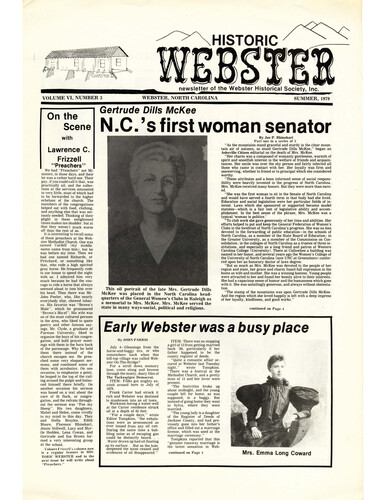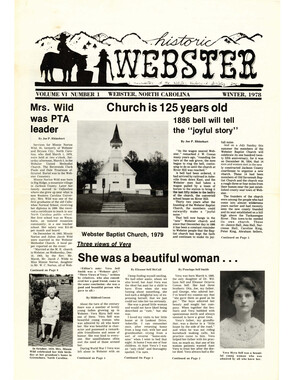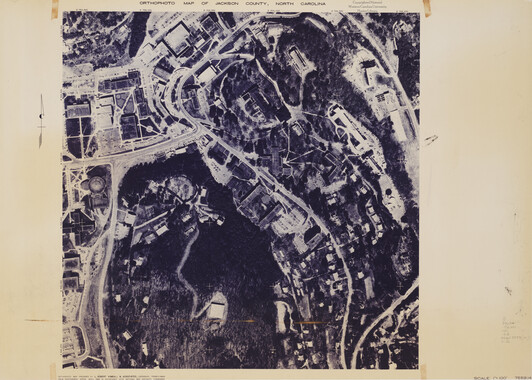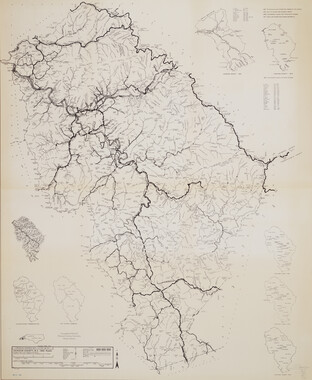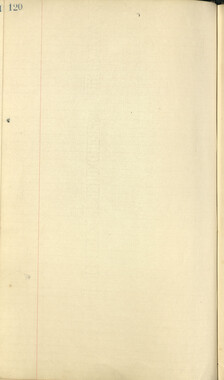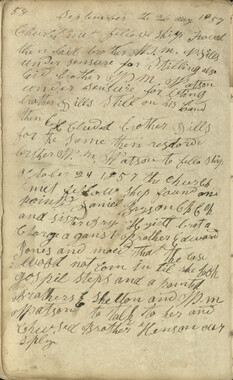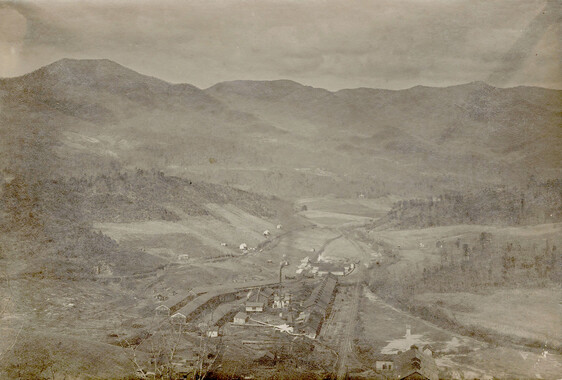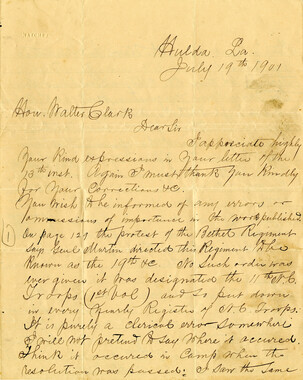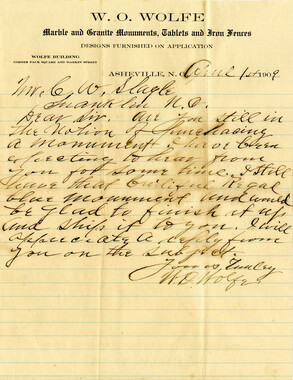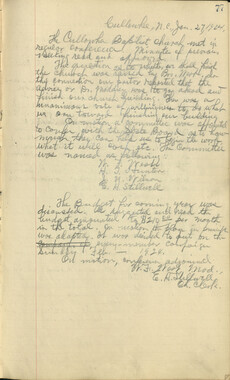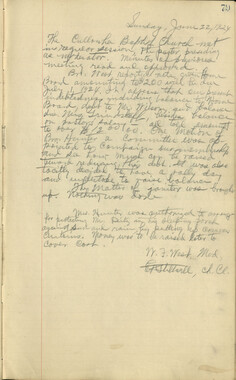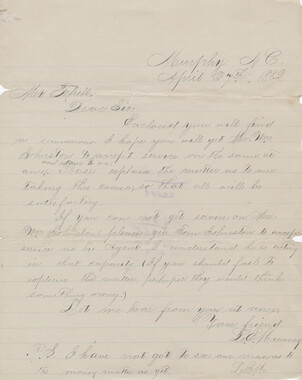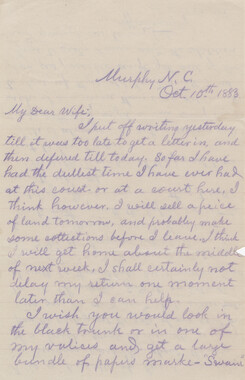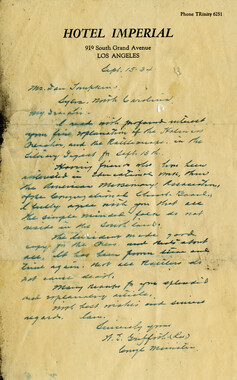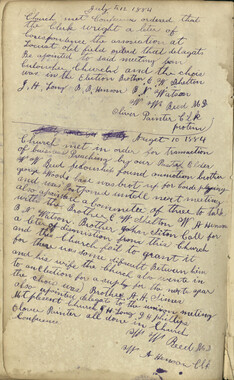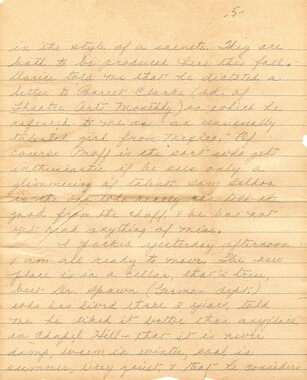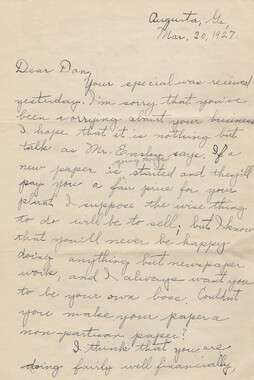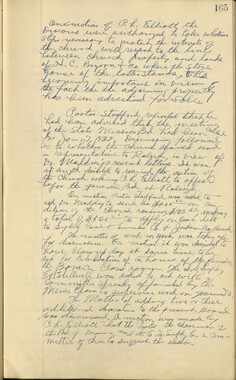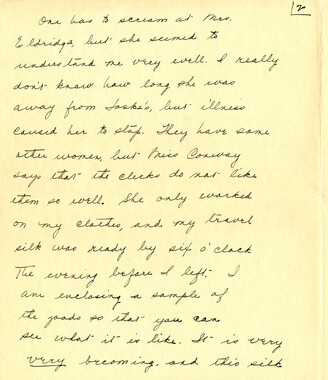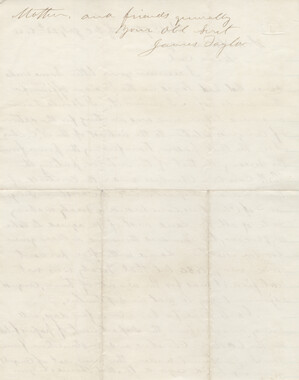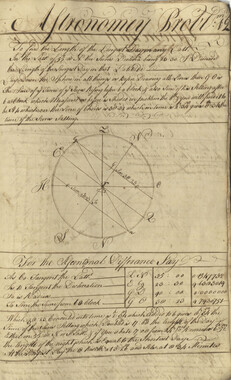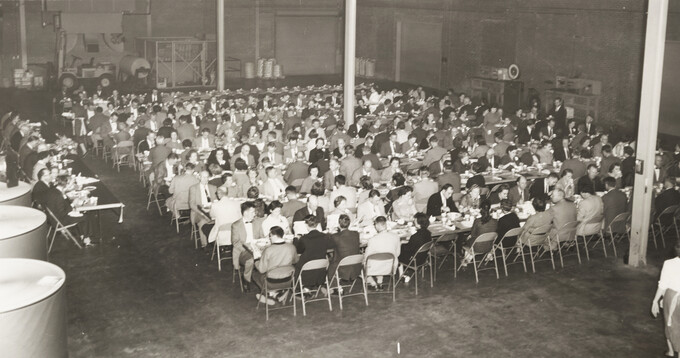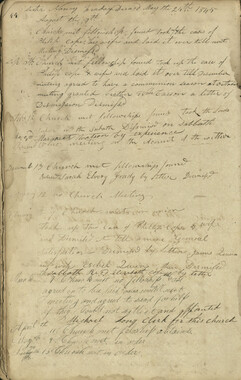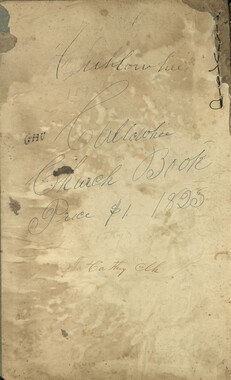Western Carolina University (20)
View all
- Canton Champion Fibre Company (2308)
- Cherokee Traditions (292)
- Civil War in Southern Appalachia (165)
- Craft Revival (1942)
- Great Smoky Mountains - A Park for America (2766)
- Highlights from Western Carolina University (430)
- Horace Kephart (941)
- Journeys Through Jackson (154)
- LGBTQIA+ Archive of Jackson County (85)
- Oral Histories of Western North Carolina (314)
- Picturing Appalachia (6772)
- Stories of Mountain Folk (413)
- Travel Western North Carolina (160)
- Western Carolina University Fine Art Museum Vitreograph Collection (129)
- Western Carolina University Herbarium (92)
- Western Carolina University: Making Memories (708)
- Western Carolina University Publications (2283)
- Western Carolina University Restricted Electronic Theses and Dissertations (146)
- Western North Carolina Regional Maps (71)
- World War II in Southern Appalachia (131)
University of North Carolina Asheville (6)
View all
- Allanstand Cottage Industries (62)
- Appalachian National Park Association (53)
- Bennett, Kelly, 1890-1974 (1388)
- Berry, Walter (76)
- Brasstown Carvers (40)
- Carver, George Washington, 1864?-1943 (26)
- Cathey, Joseph, 1803-1874 (1)
- Champion Fibre Company (233)
- Champion Paper and Fibre Company (297)
- Cherokee Indian Fair Association (16)
- Cherokee Language Program (22)
- Crowe, Amanda (40)
- Edmonston, Thomas Benton, 1842-1907 (7)
- Ensley, A. L. (Abraham Lincoln), 1865-1948 (275)
- Fromer, Irving Rhodes, 1913-1994 (70)
- George Butz (BFS 1907) (46)
- Goodrich, Frances Louisa (120)
- Grant, George Alexander, 1891-1964 (96)
- Heard, Marian Gladys (60)
- Kephart, Calvin, 1883-1969 (15)
- Kephart, Horace, 1862-1931 (313)
- Kephart, Laura, 1862-1954 (39)
- Laney, Gideon Thomas, 1889-1976 (439)
- Masa, George, 1881-1933 (61)
- McElhinney, William Julian, 1896-1953 (44)
- Niggli, Josephina, 1910-1983 (10)
- North Carolina Park Commission (105)
- Osborne, Kezia Stradley (9)
- Owens, Samuel Robert, 1918-1995 (11)
- Penland Weavers and Potters (36)
- Roberts, Vivienne (15)
- Roth, Albert, 1890-1974 (142)
- Schenck, Carl Alwin, 1868-1955 (1)
- Sherrill's Photography Studio (2565)
- Southern Highland Handicraft Guild (127)
- Southern Highlanders, Inc. (71)
- Stalcup, Jesse Bryson (46)
- Stearns, I. K. (213)
- Thompson, James Edward, 1880-1976 (226)
- United States. Indian Arts and Crafts Board (130)
- USFS (683)
- Vance, Zebulon Baird, 1830-1894 (1)
- Weaver, Zebulon, 1872-1948 (58)
- Western Carolina College (230)
- Western Carolina Teachers College (282)
- Western Carolina University (1794)
- Western Carolina University. Mountain Heritage Center (18)
- Whitman, Walt, 1819-1892 (10)
- Wilburn, Hiram Coleman, 1880-1967 (73)
- Williams, Isadora (3)
- Cain, Doreyl Ammons (0)
- Crittenden, Lorraine (0)
- Rhodes, Judy (0)
- Smith, Edward Clark (0)
- Appalachian Region, Southern (2569)
- Asheville (N.C.) (1923)
- Avery County (N.C.) (26)
- Blount County (Tenn.) (161)
- Buncombe County (N.C.) (1672)
- Cherokee County (N.C.) (283)
- Clay County (N.C.) (555)
- Graham County (N.C.) (233)
- Great Smoky Mountains National Park (N.C. and Tenn.) (519)
- Haywood County (N.C.) (3524)
- Henderson County (N.C.) (70)
- Jackson County (N.C.) (4694)
- Knox County (Tenn.) (25)
- Knoxville (Tenn.) (12)
- Lake Santeetlah (N.C.) (10)
- Macon County (N.C.) (420)
- Madison County (N.C.) (212)
- McDowell County (N.C.) (39)
- Mitchell County (N.C.) (132)
- Polk County (N.C.) (35)
- Qualla Boundary (981)
- Rutherford County (N.C.) (76)
- Swain County (N.C.) (2115)
- Transylvania County (N.C.) (270)
- Watauga County (N.C.) (12)
- Waynesville (N.C.) (84)
- Yancey County (N.C.) (72)
- Aerial Photographs (3)
- Aerial Views (60)
- Albums (books) (4)
- Articles (1)
- Artifacts (object Genre) (228)
- Bibliographies (1)
- Biography (general Genre) (2)
- Cards (information Artifacts) (38)
- Clippings (information Artifacts) (191)
- Crafts (art Genres) (622)
- Depictions (visual Works) (21)
- Design Drawings (1)
- Drawings (visual Works) (184)
- Envelopes (73)
- Facsimiles (reproductions) (1)
- Fiction (general Genre) (4)
- Financial Records (12)
- Fliers (printed Matter) (67)
- Glass Plate Negatives (381)
- Guidebooks (2)
- Internegatives (10)
- Interviews (815)
- Land Surveys (102)
- Letters (correspondence) (1013)
- Manuscripts (documents) (618)
- Maps (documents) (177)
- Memorandums (25)
- Minutes (administrative Records) (59)
- Negatives (photographs) (5835)
- Newsletters (1285)
- Newspapers (2)
- Occupation Currency (1)
- Paintings (visual Works) (1)
- Pen And Ink Drawings (1)
- Periodicals (193)
- Personal Narratives (10)
- Photographs (12976)
- Plans (maps) (1)
- Poetry (6)
- Portraits (4533)
- Postcards (329)
- Programs (documents) (151)
- Publications (documents) (2236)
- Questionnaires (65)
- Scrapbooks (282)
- Sheet Music (2)
- Slides (photographs) (402)
- Songs (musical Compositions) (2)
- Sound Recordings (796)
- Specimens (92)
- Speeches (documents) (15)
- Tintypes (photographs) (8)
- Transcripts (322)
- Video Recordings (physical Artifacts) (23)
- Vitreographs (129)
- Text Messages (0)
- A.L. Ensley Collection (275)
- Appalachian Industrial School Records (7)
- Appalachian National Park Association Records (336)
- Axley-Meroney Collection (2)
- Bayard Wootten Photograph Collection (20)
- Bethel Rural Community Organization Collection (7)
- Blumer Collection (5)
- C.W. Slagle Collection (20)
- Canton Area Historical Museum (2110)
- Carlos C. Campbell Collection (282)
- Cataloochee History Project (64)
- Cherokee Studies Collection (4)
- Daisy Dame Photograph Album (5)
- Daniel Boone VI Collection (1)
- Doris Ulmann Photograph Collection (112)
- Elizabeth H. Lasley Collection (1)
- Elizabeth Woolworth Szold Fleharty Collection (4)
- Frank Fry Collection (95)
- George Masa Collection (173)
- Gideon Laney Collection (452)
- Hazel Scarborough Collection (2)
- Hiram C. Wilburn Papers (28)
- Historic Photographs Collection (236)
- Horace Kephart Collection (861)
- Humbard Collection (33)
- Hunter and Weaver Families Collection (1)
- I. D. Blumenthal Collection (4)
- Isadora Williams Collection (4)
- Jesse Bryson Stalcup Collection (47)
- Jim Thompson Collection (224)
- John B. Battle Collection (7)
- John C. Campbell Folk School Records (80)
- John Parris Collection (6)
- Judaculla Rock project (2)
- Kelly Bennett Collection (1407)
- Love Family Papers (11)
- Major Wiley Parris Civil War Letters (3)
- Map Collection (12)
- McFee-Misemer Civil War Letters (34)
- Mountain Heritage Center Collection (4)
- Norburn - Robertson - Thomson Families Collection (44)
- Pauline Hood Collection (7)
- Pre-Guild Collection (2)
- Qualla Arts and Crafts Mutual Collection (12)
- R.A. Romanes Collection (681)
- Rosser H. Taylor Collection (1)
- Samuel Robert Owens Collection (94)
- Sara Madison Collection (144)
- Sherrill Studio Photo Collection (2558)
- Smoky Mountains Hiking Club Collection (616)
- Stories of Mountain Folk - Radio Programs (374)
- The Reporter, Western Carolina University (510)
- Venoy and Elizabeth Reed Collection (16)
- WCU Gender and Sexuality Oral History Project (32)
- WCU Mountain Heritage Center Oral Histories (25)
- WCU Oral History Collection - Mountain People, Mountain Lives (71)
- WCU Students Newspapers Collection (1744)
- Western North Carolina Tomorrow Black Oral History Project (69)
- William Williams Stringfield Collection (2)
- Zebulon Weaver Collection (109)
- African Americans (390)
- Appalachian Trail (35)
- Artisans (521)
- Cherokee art (84)
- Cherokee artists -- North Carolina (10)
- Cherokee language (21)
- Cherokee pottery (101)
- Cherokee women (208)
- Church buildings (170)
- Civilian Conservation Corps (U.S.) (110)
- College student newspapers and periodicals (1830)
- Dams (107)
- Dance (1023)
- Education (222)
- Floods (61)
- Folk music (1015)
- Forced removal, 1813-1903 (2)
- Forest conservation (220)
- Forests and forestry (1184)
- Gender nonconformity (4)
- Great Smoky Mountains National Park (N.C. and Tenn.) (181)
- Hunting (38)
- Landscape photography (25)
- Logging (118)
- Maps (83)
- Mines and mineral resources (8)
- North Carolina -- Maps (18)
- Paper industry (38)
- Postcards (255)
- Pottery (135)
- Railroad trains (71)
- Rural electrification -- North Carolina, Western (3)
- School integration -- Southern States (2)
- Segregation -- North Carolina, Western (5)
- Slavery (5)
- Sports (452)
- Storytelling (244)
- Waterfalls -- Great Smoky Mountains (N.C. and Tenn.) (66)
- Weaving -- Appalachian Region, Southern (280)
- Wood-carving -- Appalachian Region, Southern (328)
- World War, 1939-1945 (173)
Historic Webster Vol. 6 No. 3
-
Historic Webster is a newsletter of the Webster Historical Society, Inc., created at the Society’s founding in 1974. The publication helped to serve the Society's mission of collecting and preserving the history of Webster, North Carolina. Webster, established in 1851, was the original county seat for Jackson County.
-
-
~HISTORIC~ WEBSTB:R newsletter of the Webster Historica l Society, Inc. VOLUME VI, NUMBER 3 WEBSTER, NORTH CAROLINA SUMMER, 1979 On the Scene with Lawrence C. Frizzell "Preachers" We had " Preachers" not Ministers, in those days, and their lot was a ra ther hard one. Their pay , if you could call it that, was pract ically nil, and the collections at the services amounted to very little, most of which had to be forwarded to the higher echelons of the church. The members of the congregations· helped out with food, clothing , and anything else that was seriously needed. Thinking of their plight in these enlightened times makes me shudder. but at that they weren't much worse off than the rest of us. It is interes ting to recall some of these preachers at the Webster Methodist Church. One was named Cordell (my middle name came from hirri ), but he was before my time. Then we had one named Richards, or Pritchard, or something like that, who rode a high spirited gray horse. He frequently rode to our house to spend the night with us. I admired him very much because he had the cou· rage to ride a horse that always seemed about to toss him over his head. Then there was Mr. John Peeler, who, like nearly everybody else, chewed tobac· co. His favorite was "Brown 's Mule" , which he pronounced "Brown's Mu·el". His wife was on of the most cultured persons in the area , who liked to quote poetry and other famous sayings . Mr. Clyde, a graduate of Furman University, liked to organize the boys of his congre· galion, and hold prayer meet· ings with them in the barn back of the parsonage. Why he held them there instead of the church escapes me. He prea· ched some very eloquent ser· mons, and combined some of them with acrobatics. On one occasion, to emphasize a point, he leaped to the top of the railing around the pulpit and balan· ced himself there briefl y. On another occasion his sermon was based on a text about the care of th flock, or congre· galion, and the refrain through· out the sermon was "Fee my Sheep". His two daughters, Mabel and Helen, come vividly to my mind to this day. They and Stella Broyles, Edith Moore, Florence Rhinehart, Jessie Stillwell , Lucy and Myr· tie Hedden, Lena Cowan, and Gertrude and Ina Brown for med a very interesting group at the school. ColorH"I F r izzdl 's ~..:o lumn now is a re_gular l·ea ture in I-llS· TORIC WEBSTER and in the next issue he will write about "Preachers.·· Gertrude Dills McKee N.C.'s first woman senator This oil portrait of the late Mrs. Gertrude Dills McKee was placed in the North Carolina headquarters of the General Women's Clubs in Raleigh as a memorial to Mrs. McKee. Mrs. McKee served the state in many ways-social, political and religious. By Joe P. Rhinehart Part one in a series or 3 "As the mo.untains stand graceful and sturdy in the clear mountain air of autumn, so stood Gertrude Dills McKee," began an Asheville Citizen editorial on the death of Mrs. McKee. "Her charm was a compound of womanly gentleness, warmth of spirit and unselfish interest in the welfare of friends and ru:quaintances. Her smile won over the shy person and fairly infected all those who came in contact with her. Her loyalty was firm and unswerving, whether to friend or to principal which she considered worthy. "These attributes and a keen informed sense of social responsibility were heavily invested in the progress of North Carolina. Mrs. McKee received many honors. But they were more than earned. "She was the first woman to sit in the Senate of North Carolina and would have served a fourth term in that body had she lived. Education and so.cial legislation were her particular. fields of interest. Laws .which she sponsored or supported became model statutes-which is a fair test of legislative ability .and accomplishment. In the best .sense of the phrase, Mrs. McKee was a typical 'woman in politics .' "To club work she gave generously of her time and abilities. Her efforts helped to put and keep the General Federation of Women's Clubs in the forefront of North Carolina's progress. She was no less devoted to the forwarding of public education-in the schools of North Carolina, as a member of the State Board of Education ; in the Greater Univ_ersity, as a member of the Commission on Consolidation; in the colleges of North Carolina as a trustee of three in· stitutions, and especially as a long friend and patron of Western Carolina College (University). There at Cullowhee a building was named in her honor, and several years ago the Women's College of the University of North Carolina Cnow UNC at Greensboro) confer red upon her an honorary doctor of laws degree. "But as much as Mrs .. McKee was devoted to the people of her region and state, her grace and charm found full expression in the home as wife and mother. She was a winning hostess. Young people were attracted to her and found her keenly alive to their interests. She had a capacious sense of humor and the humanness. which goes with it. She was unfailingly generous, and always without obstentation. "The stamp of the mountains was upon Gertrude Dills McKee. And the region which she loved happily is left with a deep impress of her loyalty, kindliness, and good works." continued on Page 4 Early Webster was a busy place By JOHN Pi\KKIS July 4- Gleanings from the horse-and-buggy era , or who remembers back when this hi ll·top vi llage was called Webster- On-The-Bridge? For a stroll down memory lane, come along and browse through the musty, dusty files of The Tuckaseigee Democrat. ITEM: Folks got mighty ex· cite<:t around here in July of 1879. Frank Carter had struck it rich and Webster was destined to mushroom into an oil town. Workmen bormg a water-well at the Carter residence struck oil at a depth of 65 feet. "For a couple days," wrote Editor Tompkins, "the exhala tions were as pronounced as ever issued from any oil can. During the same time a bubbling noise as of escaping gas could be distinctly heard. .Water drawn up had oil floating on its surface ... But as the hole deepened the noise ceased and evidences of oil disappeared." ITEM: There was no stopping a girl of 13 from getting married back '89, particularly if her father happened to be the county register of deeds. " Quite a romantic affair occured at Webster last Tuesday night," wrote Tompkins. "There was a festival at the Methodist Church, and a pretty miss of 13 and her lover were present. "The festivit ies broke up about midnight, and the young couple left for home, as was supposed , in a buggy. But instead of going home they went to Sylva, where they were married. "The young lady is a daughter of the Register of Deeds of J ackson County, and had previously gone into her father's office and filled out a marriage license, which was used at the marriage ceremony. ' ' Tompkins reported that this "genuine runaway marriage is the latest sensation in Web-continued on Page 4 Mrs. Emma Long Coward Page 2, HISTORIC WEBSTER, Summer, 1979 Pages from a Webster scrapbook PhotographsfromlsabeiAI itil'>:;i ' ~·If~ ~~.J-h,..,... c,,."' .._.,. ,'~ ....,..K~ C.,.,o-~_, ~·~~~t..~tj ,AYM
.ef ~.,.,J.A...1,"~"'e._.~"-1 ~0~ Page 4, HISTORIC WEBSTER, SUMMER 1979 Mc:Kee was early leader continued rrom P~ ge t Gertrude Dills was born in 1886 in the little mountain village of Dillsboro in Jackson County. She was the daughter of William Dills, legislator from Jackson in 1889 and founder of the town of Dillsboro. Her mother was Alice Enloe Dills. Mr. Dills was a business man of unusual ability. Having three daughters and no sons, there seemed little likelihood that there would be a successor to his service. In his day there was little or nothing known of the possibilities of women's talents. It would have warmed his heart and the heart of every pioneer worker for the women's movement to have s.een the enthusiam with which. his second daughter was elected the first woman state senator in North Carolina. At Peace College in Raleigh Miss Gertrude Dills was president nf her class and sorority. In the class of 1905 she was graduated with highest honors. From her graduation until her marriage to Ernest Lyndon A worker in the women's movement McKee, a pioneer industrialist in Jackson County, on August 19, 1913, Miss Dills taught school. Mrs. McKee began her first organization work during World War I, when she began to attract statewide attention for the effective work she did for the Salvation Army, Liberty Loans, and savings stamp drives. Mrs. McKee's first state office came in .May of 1925 when she was elected president of North Carolina Federation of Women's Clubs. She campaigned for a survey of women in industry. Although the survey was never made, she did pursuade Governor A. W. McLean to order it, after he had decided against it. However, it was finally called off when a controyersy _ arose over who should conduct the investigation. The women of North Carolina were_ well represented when they chose Mrs. McKee as their leader. No matter where she went she was fighting for the rights of her fellow women. At a convention in Asheville, she told the Carolina women that the ballot was the strongest weapon of their sex. It was time for them to start going to conventions and primaries .and in this way began to discharge their responsibilities as citizens. Mrs. McKee said that she saw ation. At Charleston she was chosen president by unanimous vote. Mrs. Eugene Davis of Wilson, North Carolina, said, " If North Carolina Club women could have seen Mrs. McKee and heard her address at the closing session when she was presented in her new role, they would have thrilled with pride as the two North Carolina representatives did." On her last day in Charleston she reviewed the troops at Fort Moultrie. " I know one thmg, 1 was thrilled," said Mrs. Mc.Kee, who served as state and council president at the same time. In October of 1928 the North Carolina division of the United Daughter's of the Confederacy Recoll~~tions ~·~ Janice Monteith Blanton "Miss Nan Frizzell" Webster seems to have a magnetic pull on its citizens who move away and often folks who have spent their working years in other towns have a way of "finding their way back home." This was the case with Miss Nan Frizzell. Miss Nan, as she was fondly called by her friends and neighbors, moved back to Webster in the fift ies after working many years in Washington , D. C. We kids noticed activity around the house above Archie Ell iot 's, and then, one day, Miss Nan just appeared as if she'd never been gone. At first the young people were somewhat shy of Miss Nan who, on the surface, had an austere and formidable appearance. However , time and association proved this impression grossly wrong, and we quickly felt very close to her. Soon it was as if she had always been in the neighborhood. Falling r ight back into the mainstream of Webster life seemed natural to Miss Nan. As with others in the community, she took great pride in her yard and small garden and routinely went to the post office for her mail, the latest weather forecast and village news. Her membership and faithful attendance at the Webster Methodist Church were quickly renewed. On Sunday morning, Miss Nan, tall and slender, could be seen walking by our house on her way to church. She was always primly dressed in a cotton dress with her pocket book on her arm, and a hat on her grey head . Two memories of Miss Nan are particularly fond for me. One always brings a smile and the other reminds me of her great influence on my life and leaves me very thankful: As with so many of our neighbors, Miss Nan seemed to take a special interest and pride in Webster's young people. The young and old did not suffer from a generation gap, and we freely discussed our plans and aspirations with the older folks. Miss Nan never married, but I remember how interested she seemed in my marriage plans in 1960. She gave her stamp of approval to the wedding dress which I planned to have made. Plans for having the dress made were later changed, however, when I came upon a "bargain dress" which I bought instead. Jean Etta Cannon told me that she had seen three beautiful wedding gowns in a bargain store in Sylva. Upon examination , I found that the dresses were not used (the price tags were still on them) but apparently had not sold in some northern store and were given to the cause of the store in Sylva. One, very much like the pattern I had , was absolutely beautiful, and a perfect fit. So for $7.00, and the price of dry cleaning, I bought an $85.00 wedding dress. Somehow, Miss Nan learned of my purchase and she apparently viewed the situation differently. I later was told that while I walked proudly down the aisle wearing what I felt to be a very practical, economical, and beautiful dress, Miss Nan was sitting in the audience in horror of the whole thing, feeling sorry for me and lamenting over " what a shame it was that I was getting married in a 'bargain dress'." Such was the closeness of our one big Webster fami ly! Continued Next Issue . , , . ~HISTORIC~ ;~~r/' WEBSTEi newsletter ol lheWebsler Historical Society. Inc. Summer. 1979 Webster, North Carolina 28788 Editor Joe P. Rhinehart Contributors: Janice Monteith Blanton. Lawrence C. Frizzell. John Parris, Annie Louise Madison Reed, Isabel Allison Carlton, Kate Rhinehart, Jenny Hunter P ~bli shed quarterly by the Webster Historical Society and prmted by the Herald Publishing Company, Sylva, North Ca rolina. Women must be interested in politics " Webster is still in the lead," Tompkins wrote. "One of her progressive citizens, 0. B. Coward, has put down the first piece of paved sidewalk ever seen in Jackson County. He has fin ished up about 40 feet in front of his store. " Webster, North Carolina 28788 no reason for WDmen shying at politics or politicians. " In these days the woman who is not interested in politics is neither an intelligent_ or patriotic citizen.'' Mrs. McKee was chosen at the biannual convention of the Southeastern Co..uncil of Women's Clubs which met in Charleston, South Carolina in 1926, as the new president. The chairmanship of the Council was second only to the presidency of the General Feder- But now 50 years later there's not a foot of paved sidewalk in the town that died and only now is coming back. ITEM: Folks packed the auditorium one night in 1908 to see a cast of local talent present "Under The Southern Cross", a moonlight-and-roses epic of the Civil War. Editor-turned-drama critic Tompkins tossed a big bouquet
